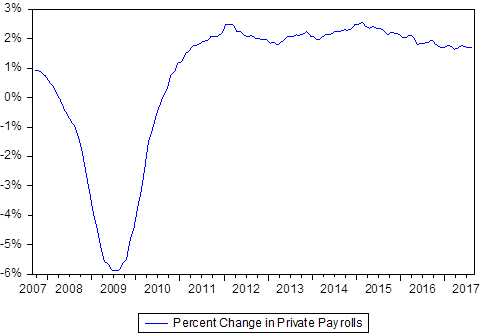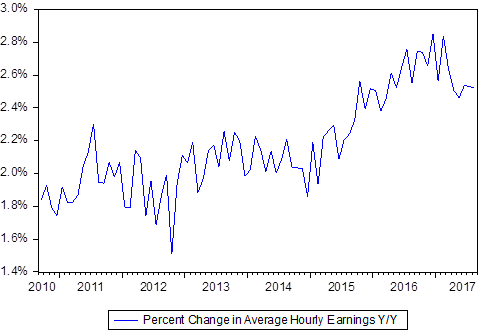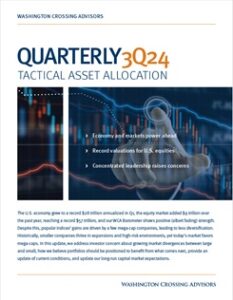Monday Morning Minute 100217
THE WEEK AHEAD
Markets (and the Federal Reserve (Fed)) get a read on the health of the labor market as the September Employment Report is released on Friday.
MACROECONOMIC INSIGHT
Friday’s report is expected to show that the economy added 70,000 jobs while the unemployment rate remained steady at 4.4%. While much airtime will be spent dissecting those headline figures, we want to focus on two other aspects of this report: the change in private payrolls (Chart A) and the yearly change in average hourly earnings (Chart B).
While the trend for both of these figures is generally positive, recently the growth in each has begun to moderate. The percent change in private payrolls has been range bound between 1 to 3% since the beginning of the most recent recovery and currently sits around 1.7%. In the past we’ve looked for indications of stress when that figure drops below 1%. In this case, with regards to the growth of private payrolls, the labor market appears to be on relatively solid ground.
The trend for wages is positive on a year-over-year basis, though growth has sat around 2.5% since earlier this year. The lack of inflation can explain away some of the stagnant wage growth. With payrolls expanding and the unemployment rate where it is, one could reasonably argue that the labor market is nearing full employment – in which case we would expect to see wage growth pick up in the coming months.
Chart A
Source: Bloomberg
Source: Bloomberg
ECONOMIC DATA THIS WEEK
| Date | Report | Period | Survey | Prior |
| Monday, Oct 2: | ISM Manufacturing Index | Sep | 57.5 | 58.8 |
| PMI Manufacturing Index | Sep | — | 53.0 | |
| Construction Spending M/M | Aug | 0.4% | -0.6% | |
| Tuesday, Oct 3: | Domestic Vehicle Sales | Sep | 12.5M | 12.48M |
| Total Vehicle Sales | Sep | 16.6M | 16.03M | |
| Wednesday, Oct 4: | ADP Employment Report | Sep | 160K | 237K |
| ISM Non-Manufacturing Index | Sep | 55.1 | 55.3 | |
| Thursday, Oct 5: | Weekly Jobless Claims | Sep 30 | — | 272K |
| International Trade | Aug | -$43.9B | -$43.7B | |
| Factory Orders | Aug | 0.7% | -3.3% | |
| Friday, Oct 6: | Change in Nonfarm Payrolls | Sep | 70K | 156K |
| Change in Private Payrolls | Sep | 55K | 165K | |
| Unemployment Rate | Sep | 4.4% | 4.4% | |
| Average Hourly Earnings M/M | Sep | 0.3% | 0.1% | |
| Average Hourly Earnings Y/Y | Sep | — | 2.5% | |
| Average Weekly Hours | Sep | 34.4 | 34.4 | |
| Labor Force Participation Rate | Sep | — | 62.9% | |
| Underemployment Rate | Sep | — | 8.6% | |
| Source: Bloomberg |
ASSET ALLOCATION PORTFOLIO POSTURE
Based on shorter-term expectations, the “tactical” allocation within portfolios is equally weighted between bonds and stocks.
Client approved reports and commentaries click here
Kevin Caron, CFA, Senior Portfolio Manager
Chad Morganlander, Senior Portfolio Manager
Matthew Battipaglia, Portfolio Manager
Suzanne Ashley, Analyst
(973) 549-4052 www.washingtoncrossingadvisors.com www.stifel.com
———————————————————————————————————————————————————————–
Disclosures
WCA Fundamental Conditions Barometer Description: We regularly assess changes in fundamental conditions to help guide near-term asset allocation decisions. The analysis incorporates approximately 30 forward-looking indicators in categories ranging from Credit and Capital Markets to U.S. Economic Conditions and Foreign Conditions. From each category of data, we create three diffusion-style sub-indices that measure the trends in the underlying data. Sustained improvement that is spread across a wide variety of observations will produce index readings above 50 (potentially favoring stocks), while readings below 50 would indicate potential deterioration (potentially favoring bonds). The WCA Fundamental Conditions Index combines the three underlying categories into a single summary measure. This measure can be thought of as a “barometer” for changes in fundamental conditions.
The information contained herein has been prepared from sources believed to be reliable but is not guaranteed by us and is not a complete summary or statement of all available data, nor is it considered an offer to buy or sell any securities referred to herein. Opinions expressed are subject to change without notice and do not take into account the particular investment objectives, financial situation, or needs of individual investors. There is no guarantee that the figures or opinions forecasted in this report will be realized or achieved. Employees of Stifel, Nicolaus & Company, Incorporated or its affiliates may, at times, release written or oral commentary, technical analysis, or trading strategies that differ from the opinions expressed within. Past performance is no guarantee of future results. Indices are unmanaged, and you cannot invest directly in an index.
Asset allocation and diversification do not ensure a profit and may not protect against loss. There are special considerations associated with international investing, including the risk of currency fluctuations and political and economic events. Investing in emerging markets may involve greater risk and volatility than investing in more developed countries. Due to their narrow focus, sector-based investments typically exhibit greater volatility. Small company stocks are typically more volatile and carry additional risks, since smaller companies generally are not as well established as larger companies. Property values can fall due to environmental, economic, or other reasons, and changes in interest rates can negatively impact the performance of real estate companies. When investing in bonds, it is important to note that as interest rates rise, bond prices will fall. High-yield bonds have greater credit risk than higher-quality bonds. The risk of loss in trading commodities and futures can be substantial. You should therefore carefully consider whether such trading is suitable for you in light of your financial condition. The high degree of leverage that is often obtainable in commodity trading can work against you as well as for you. The use of leverage can lead to large losses as well as gains.
All investments involve risk, including loss of principal, and there is no guarantee that investment objectives will be met. It is important to review your investment objectives, risk tolerance and liquidity needs before choosing an investment style or manager. Equity investments are subject generally to market, market sector, market liquidity, issuer, and investment style risks, among other factors to varying degrees. Fixed Income investments are subject to market, market liquidity, issuer, investment style, interest rate, credit quality, and call risks, among other factors to varying degrees.
This commentary often expresses opinions about the direction of market, investment sector and other trends. The opinions should not be considered predictions of future results. The information contained in this report is based on sources believed to be reliable, but is not guaranteed and not necessarily complete.
Washington Crossing Advisors LLC is a wholly owned subsidiary and affiliated SEC Registered Investment Adviser of Stifel Financial Corp (NYSE: SF).





